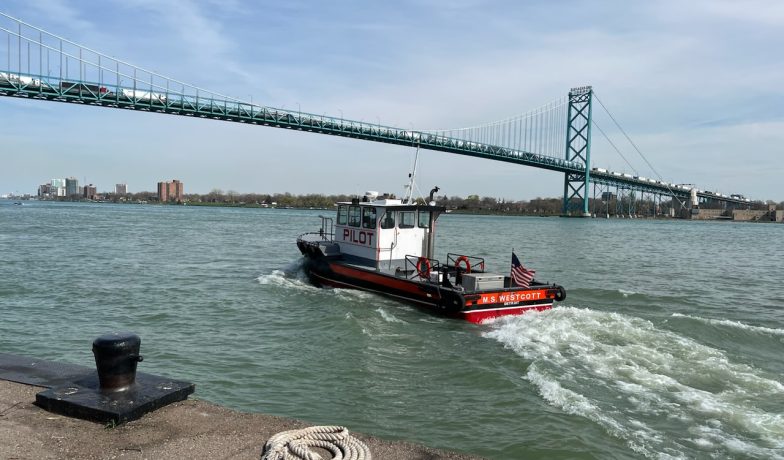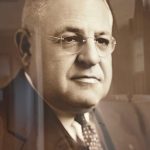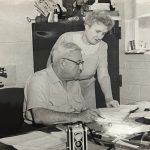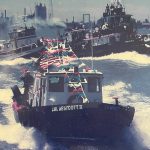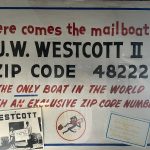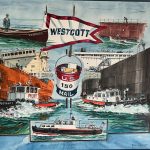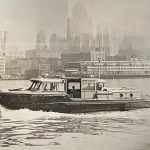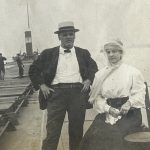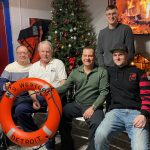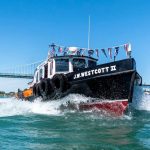J.W. Westcott Celebrates 150 Years of Mail to Pail
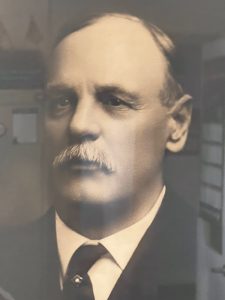
With the simple understanding that there needed to be a way to get mail and products from shore to ship, the Westcott family took a chance to turn their maritime roots into a shipping business. J.W. Westcott was launched in 1874. Now, 150 years later, deliveries are still made as they were back then, through buckets and heaving lines.
Well-Oiled Machine
According to Jim Hogan, current president of the company and the third generation in the family business, the entire operation runs much as it has since it opened its doors.
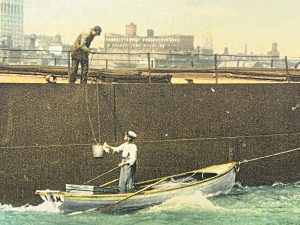
“There’s no other way to do this,” he said. “We started to meet vessels while they were on the move, to not slow them down or cause them to get off track. There are companies trying to use drones, but right now that only works if a ship is docked.”
The only change is how the company conducts inventory and billing. “We started with pencils and ledgers and now use fingers on keyboards,” Hogan said. “We used to look through the windows with binoculars to locate ships, and now we can see their exact movement on a screen. Technology has facilitated our knowledge, but not how we do the job.” A pilot goes out to the ship and climbs a ladder or places items in a bucket. Several decades ago, that process was dubbed Mail by the Pail, and that name still holds, although deliveries now include mechanical parts, groceries and many Amazon packages.
The company has three tugboats: the J.W. Westcott II built in 1949; the Joseph Hogan, named after Hogan’s dad and built in 1995; and the Mildred Simpson, named after Hogan’s mother and used primarily for pilot changes.
The JW Westcott II plays dual roles as delivery vessel and tour boat for excursions along the Rogue River. The tugs and a handful of delivery vehicles are the main components of the business operations, but the company also just opened an event space for rent to provide more year-round employment opportunities.
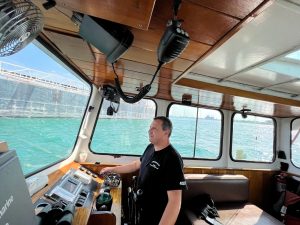
The small staff works two at a time on a rotating basis to keep the deliveries rolling. Hogan describes the job as similar to a firehouse, but where just two people split the duties of communications and licensed captain on the tugboat.
“We sit and wait for the next ship to go through the port,” Hogan said. “We may have two to three come through in an hour, or we may sit for several hours and have no calls. But when the bell goes off, we’re ready to go.”
He further explained that his employees are highly specialized, as it takes skill to put a small tug alongside a giant ship. That is why the company remains small.
“Our employees get an experience they can’t get anywhere else,” Hogan said. “I’ve met former employees who tell me their greatest life experience was made right here.” No two days are the same, and some days it’s possible to make 18 to 20 deliveries, although Hogan said those days are not as frequent now that ships are larger and can haul more.
“When I was younger, the ships were much smaller, so the fleets were larger,” Hogan said. “That meant more traffic. Shipping companies have since cut costs by using bigger ships and larger crews.”
A Storied History
The reputation of J.W. Westcott grew with the company. In 1948, it became an official U.S. Postal Service mail boat and soon became the world’s first non-military floating postal ZIP code. In the 1960s, J.W. Westcott received a contract to serve as the transportation for both Canadian and U.S. pilot changeovers, which are mandated to happen in Detroit.
Hogan’s journey to lead the company started early.
“My dad would bring me down to the office in the summer and put me under the wings of our crews, and I’d get in everyone’s way,” he said. “When I could read and write, I’d write letters to the ship captains, requesting photos of their ships.”
With his mother being the granddaughter of founder John Westcott and his father a long-time leader in the company, his career was destined.
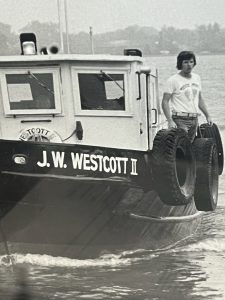
He began working at J.W. Westcott in the summer when the company turned 100, starting part-time while he was in school and working his way up. As the job is seasonal, he also worked as a high school hockey coach. Hogan said the only thing that would have pulled him in another direction was the possibility of a professional hockey career, but he said he didn’t have that level of talent. However, he still regularly hits the rink with his teammates – a group who met through hockey when they were kids and have continued playing into their mid-60s.
The 5th generation is already in place at J.W. Westcott, with Hogan’s son Jimmy now the vice president. He too started working during summer vacations, but he went to college to study criminology and psychology. But the water called, and he ended up getting his captain’s license.
“He’s the most educated captain I’ve ever had,” Hogan quipped. “He’s the future, and he has a lot of ideas for tomorrow.”
Hogan’s younger son, Bryan, followed in his father’s other footsteps, wearing skates. He played hockey for the University of Michigan, then for a U.S. junior league in Nebraska, and went on to play overseas. Hogan said about both of his sons, “It’s like watching my life in front of me again, but better.”
Celebrating 150 years in business is an accomplishment that the whole area came out to celebrate during a three-day event pulled together by the Southeast Michigan Chamber of Commerce. Local politicians, the postmaster of Detroit, 30 managers from the postal service, members of the International Shipmaster Association, numerous former employees, family and friends all joined in the celebration and spoke about the critical role JW Westcott has played not just for the ships, but for the community as well.
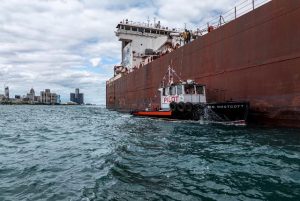
Hogan pointed out that as long as there are ships plying the waters of the Great Lakes, there will be a need for the service his family’s company provides.
“Everything around us has changed, but we haven’t,” he said. “The one thing that has stayed the same is the necessity of what we do.”
- John Ward Westcott II
- John Ward Westcott II and Mildred Simpson Westcott
- J.W. Westcott II
- 1963, J.W. Westcott issued its own ZIP Code
- Art by Paul LaMarre Jr.
- First larger vessel used by J.W. Westcott Company
- Captain John Ward Westcott and Henrietta Crane Westcott
- J.W. Westcott crew, left to right: Bill Redding, Jim Hogan, Sam Buchanan, Joe Buchanan, Jimmy Hogan
- J.W. Westcott II
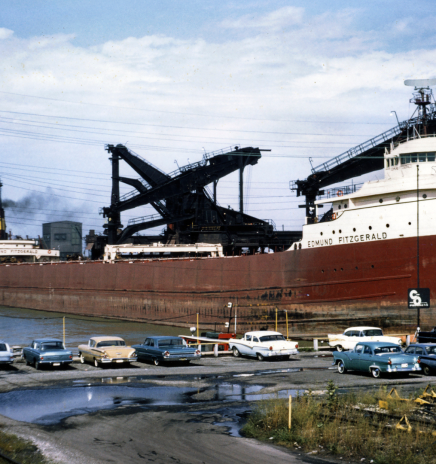
50th Anniversary of the Sinking of the SS Edmund Fitzgerald
It has been 50 years since the tragic sinking of the SS Edmund Fitzgerald on Lake Superior. On November 10, 1975, the Great Lakes freighter sank during a storm just... Read More
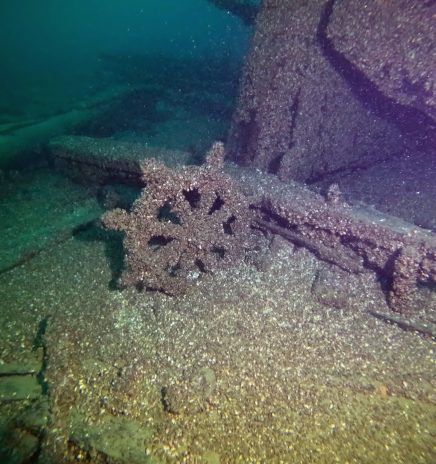
Wreckage of F.J. King Found After 139 Years
The Wisconsin Underwater Archeology Association (WUAA) has announced the discovery of the long-sought wreck of the schooner F.J. King, which sank in a storm off Baileys Harbor, Wisconsin, on September... Read More

